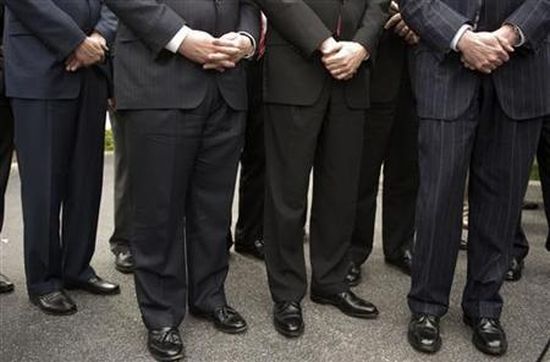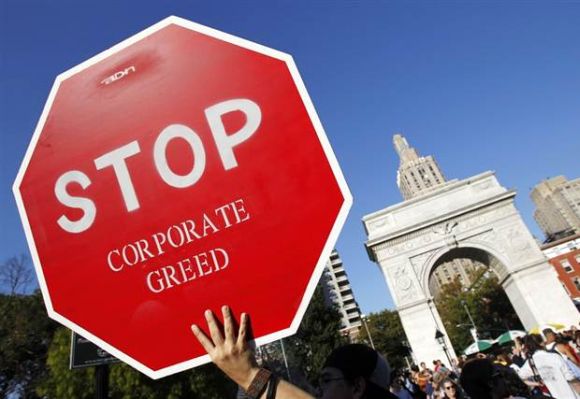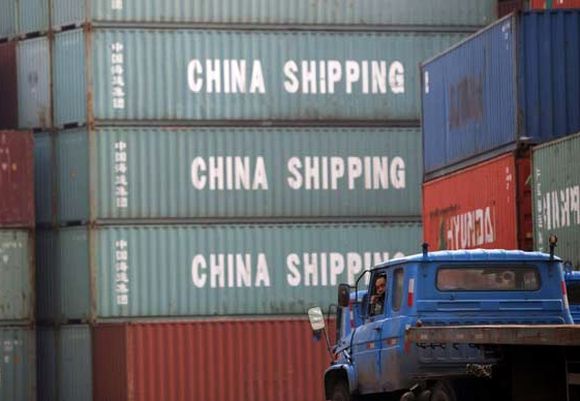Photographs: Chip East/Reuters Edward Hadas in London
Despite the financial crisis of 2008, the finance industry is still arrogant, isolated and ridiculously lucrative.
In many ways, the financial world has changed remarkably little in the five years since the 2008 financial crisis.
Yes, banks, brokers and other intermediaries are neither as profitable nor as popular as in the pre-crisis years. However, the industry is still arrogant, isolated and ridiculously lucrative.
Leading financiers look more like pre-revolutionary aristocrats than normal businessmen.
Pay is the most obvious sign of this privileged social position. Consider JPMorgan, a fairly typical financial firm in terms of remuneration. Last year, the annual compensation per employee was $192,000.
...
The dangerous aristocrats of finance
Image: People exit the lobby of JPMorgan Chase & Co. headquarters in New York.Photographs: Eduardo Munoz/Reuters
That already seems high, but the measure includes the majority of employees whose pay is bunched around the $45,000 average for non-supervisory US workers in finance. Assume that two-thirds of Morgan's employees were in that group.
For the rest, the people at the top and upper middle of the company, that leaves an average pre-tax reward of $485,000 - more than 10 times the norm of the lower orders.
Few senior hedge fund managers, successful inter-broker dealers or other high earners in finance see themselves as seriously overpaid. They are wrong.
The rewards for financiers are excessive by three standards. First, professionals with comparable skills earn much less. Second, financiers are paid far more than is merited by their contributions to the common good.
It is telling that the most richly rewarded financial activities - trading, advanced financial engineering and sales - are more likely to subtract than to add economic value.
...
The dangerous aristocrats of finance
Photographs: Reuters
Finally, there is the matter of justice. Penance was in order after the industry's foolish behaviour in the years leading up to the crisis. But instead of sackcloth and ashes, or bread and water, there are designer clothes and helicopter skiing, caviar and champagne.
The excessive pay can be interpreted as a sign of unfair or inefficient markets. It is that, but I think the deeper cause is not so much economic as sociological.
Financiers have persuaded the broader society that they are modern aristocrats. Pampered lives are part of the package.
They go along with an unthinking sense of entitlement and a mix of self-righteousness and self-centredness, with just a hint of condescending tolerance for limited criticism.
Of course, today's financial aristocracy is different from traditional nobility. The contemporary titles (partner, managing director) and privileges (first-rate education, political influence) are not exactly hereditary, and long hours on the job have replaced a life of leisure. But I believe the commonalities are more significant.
...
The dangerous aristocrats of finance
Photographs: Shannon Stapleton/Reuters
Old aristocrats believed they protected social stability and dismissed radical critics as ignorant and disruptive. Similarly, most financial aristocrats are certain that the world would be much worse off without them and that their exalted position is good for everybody.
Ask an articulate trader about the social value of playing the yield curve to the detriment of clients, and the response will have the same unthinking certainty as a French count asked about the justice of the corvee. The trader dismisses radical critics as well-intentioned but ignorant about the importance of high (and highly paid) finance.
In my view, the sociological analysis provides more insight into the industry's condition than the more common argument about "heads I win, tails you lose" incentives.
I rarely meet financiers who would admit to being reckless or wasteful. What I observe is sublime and blind self-confidence.
...
The dangerous aristocrats of finance
Photographs: Jessica Rinaldi/Reuters
Living largely with other members of their caste, they rarely have doubts. To them, more finance is always better than less and higher margins always better than lower.
They welcome the development of more complicated financial products; they don't worry much about the effect of these products on the rest of the economy.
Why has the financial aristocracy been able to hold on to so many of its privileges, despite its colossal failure in 2008? Again, look to sociology.
There has been no revolution because there is no social force comparable to the rising French urban bourgeoisie, which exposed the uselessness of the old rural aristocracy, and eventually replaced them.
...
The dangerous aristocrats of finance
Image: A trucker smokes as he waits to transport shipping containers at the Port of Shanghai.Photographs: Aly Song/Reuters
Right now, almost all power groups seem to be in thrall to the money men. Central bankers, who have good reason to complain, are either financiers themselves or unable to resist their pleas for special treatment.
Politicians, who have even more grounds for discontent - the majority of voters who borrow and suffer in the financiers' credit-intensive economy - pay them court. Regulators, who should be shocked and appalled, are easily bamboozled or bought off with promises of joining the aristocracy later. Even borrowers are often grateful for their expensive loans.
Still, a revolution may come, even if the disempowered 99 percent don't rebel. China is in a good position to play the leading role. Its trade surpluses, recycled into financial markets, help make the industry highly profitable. Whenever that money disappears, the current system could fall apart, and its leaders might finally learn something like humility.
The author is a Reuters Breakingviews columnist. The opinions expressed are his own.








article